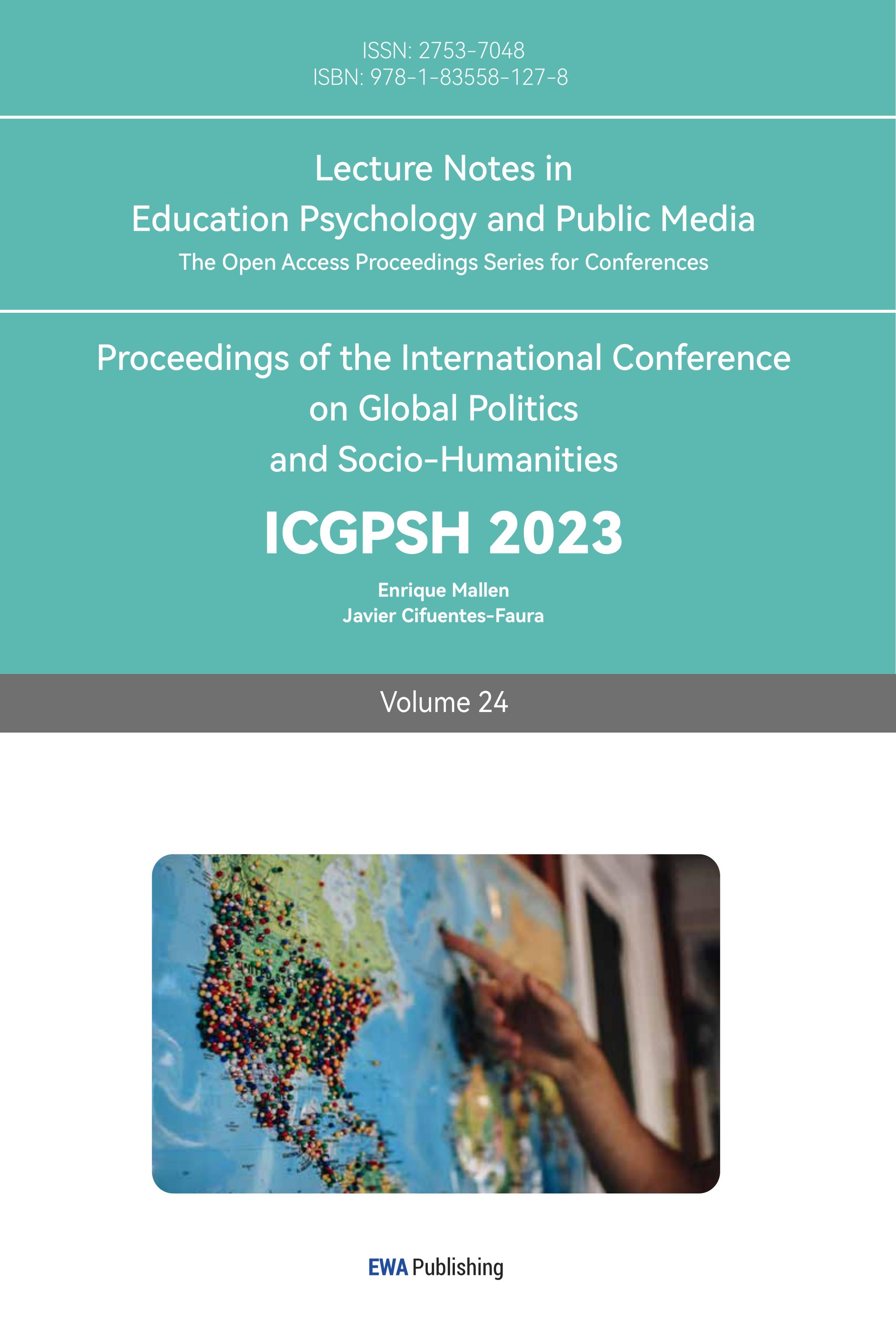References
[1]. Geiss, I. (1966). The Outbreak of the First World War and German War Aims, Journal of Contemporary History, 1(3), 75-91.
[2]. Mombauer, A. (2013). The Fischer Controversy, Documents and the ‘Truth’ About the Origins of the First World War, Journal of Contemporary History, 48(2), 290-314.
[3]. Schroeder, P. W. (1989). The Nineteenth Century System: Balance of Power or Political Equilibrium, Review of International Studies, 15(2), 135-153.
[4]. Snyder, J. and Lieber, K. A. (2008). Defensive Realism and the “New” History of World War I. International Security, 33(1), 174–194.
[5]. Van Evera, S. (1984). The Cult of the Offensive and the Origins of the First World War. International Security, 9(1), 58–107.
[6]. Willis, E. F. (1938). Anglo-German Rivalry Before the World War. The Southwestern Social Science Quarterly, 19(3), 292–303.
[7]. Lynn-Jones, S. M. (1986). Détente and Deterrence: Anglo-German Relations, 1911-1914. International Security, 11(2), 121–150.
[8]. Pfaltzgraff, R. L. (2019). World War I and IR Theory. The Fletcher Forum of World Affairs, 43(1), 5–18.
[9]. Mearsheimer, J. J. (2014). The Tragedy of Great Power Politics. W. W. Norton.
[10]. Rosato, S. (2021). Intentions in Great Power Politics: Uncertainty and the Roots of Conflict. Yale University Press. Retrieved from https://doi.org/10.2307/j.ctv1k03gb9
[11]. Jervis, R. (1978). Cooperation Under the Security Dilemma. World Politics, 30(2), 167–214.
[12]. Jeffery, K. (2008). Field Marshal Sir Henry Wilson: A Political Soldier. Oxford: Oxford University Press.
[13]. Baylis, J. and Smith, S. (2011). The Globalization of World Politics: An Introduction to International Relations. Oxford: Oxford University Press.
[14]. Reid, W. (2006). Architect of Victory: Douglas Haig. Birlinn. Retrieved from https://books.google.se/books?id=5UNnAAAAMAAJ
[15]. Bennett, E. W. (1988). Intelligence and History from the Other Side of the Hill. Retrieved from The Journal of Modern History, 60(2), 312–337.
[16]. Young, H. F. (1976). The Misunderstanding of August 1, 1914, The Journal of Modern History, 48(4), 644-655.
[17]. Morley, J. V. (2013). Memorandum On Resignation. Read Books Limited.
[18]. Clark, C. (2016). Sir Edward Grey and the July Crisis. The International History Review, 38(2), 326–338.
[19]. Koss, S. E. (1985). Asquith. London: Penguin Books, Limited.
Cite this article
Yang,C. (2023). Germany’s Strategic Misjudgment of World War I: Based on the Impact of Anglo-German Diplomatic Interaction. Lecture Notes in Education Psychology and Public Media,24,83-88.
Data availability
The datasets used and/or analyzed during the current study will be available from the authors upon reasonable request.
Disclaimer/Publisher's Note
The statements, opinions and data contained in all publications are solely those of the individual author(s) and contributor(s) and not of EWA Publishing and/or the editor(s). EWA Publishing and/or the editor(s) disclaim responsibility for any injury to people or property resulting from any ideas, methods, instructions or products referred to in the content.
About volume
Volume title: Proceedings of the International Conference on Global Politics and Socio-Humanities
© 2024 by the author(s). Licensee EWA Publishing, Oxford, UK. This article is an open access article distributed under the terms and
conditions of the Creative Commons Attribution (CC BY) license. Authors who
publish this series agree to the following terms:
1. Authors retain copyright and grant the series right of first publication with the work simultaneously licensed under a Creative Commons
Attribution License that allows others to share the work with an acknowledgment of the work's authorship and initial publication in this
series.
2. Authors are able to enter into separate, additional contractual arrangements for the non-exclusive distribution of the series's published
version of the work (e.g., post it to an institutional repository or publish it in a book), with an acknowledgment of its initial
publication in this series.
3. Authors are permitted and encouraged to post their work online (e.g., in institutional repositories or on their website) prior to and
during the submission process, as it can lead to productive exchanges, as well as earlier and greater citation of published work (See
Open access policy for details).
References
[1]. Geiss, I. (1966). The Outbreak of the First World War and German War Aims, Journal of Contemporary History, 1(3), 75-91.
[2]. Mombauer, A. (2013). The Fischer Controversy, Documents and the ‘Truth’ About the Origins of the First World War, Journal of Contemporary History, 48(2), 290-314.
[3]. Schroeder, P. W. (1989). The Nineteenth Century System: Balance of Power or Political Equilibrium, Review of International Studies, 15(2), 135-153.
[4]. Snyder, J. and Lieber, K. A. (2008). Defensive Realism and the “New” History of World War I. International Security, 33(1), 174–194.
[5]. Van Evera, S. (1984). The Cult of the Offensive and the Origins of the First World War. International Security, 9(1), 58–107.
[6]. Willis, E. F. (1938). Anglo-German Rivalry Before the World War. The Southwestern Social Science Quarterly, 19(3), 292–303.
[7]. Lynn-Jones, S. M. (1986). Détente and Deterrence: Anglo-German Relations, 1911-1914. International Security, 11(2), 121–150.
[8]. Pfaltzgraff, R. L. (2019). World War I and IR Theory. The Fletcher Forum of World Affairs, 43(1), 5–18.
[9]. Mearsheimer, J. J. (2014). The Tragedy of Great Power Politics. W. W. Norton.
[10]. Rosato, S. (2021). Intentions in Great Power Politics: Uncertainty and the Roots of Conflict. Yale University Press. Retrieved from https://doi.org/10.2307/j.ctv1k03gb9
[11]. Jervis, R. (1978). Cooperation Under the Security Dilemma. World Politics, 30(2), 167–214.
[12]. Jeffery, K. (2008). Field Marshal Sir Henry Wilson: A Political Soldier. Oxford: Oxford University Press.
[13]. Baylis, J. and Smith, S. (2011). The Globalization of World Politics: An Introduction to International Relations. Oxford: Oxford University Press.
[14]. Reid, W. (2006). Architect of Victory: Douglas Haig. Birlinn. Retrieved from https://books.google.se/books?id=5UNnAAAAMAAJ
[15]. Bennett, E. W. (1988). Intelligence and History from the Other Side of the Hill. Retrieved from The Journal of Modern History, 60(2), 312–337.
[16]. Young, H. F. (1976). The Misunderstanding of August 1, 1914, The Journal of Modern History, 48(4), 644-655.
[17]. Morley, J. V. (2013). Memorandum On Resignation. Read Books Limited.
[18]. Clark, C. (2016). Sir Edward Grey and the July Crisis. The International History Review, 38(2), 326–338.
[19]. Koss, S. E. (1985). Asquith. London: Penguin Books, Limited.









